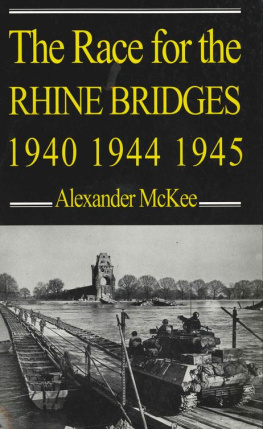My grateful thanks to: Bryan Watkins, my guide and adviser throughout; Bobby Gainher, my editor; Brigadier Henry Wilson and his team at my publishers, Pen & Sword Books Ltd.; Andrew Hewson and his team at my agents, Johnson & Alcock Ltd.; Sylvia Menzies-Earl for her help with the manuscript; Philip Fisher and the staff at the Birmingham Institute & Library and the staff of the Taylor Library for their help with the photographs. My thanks and my appreciation.
Every effort has been made to trace copyright holders but where this has proved unseccessful, sincere apologies are offered.
Conclusion
On 1 October 1945, when Alexander relinquished his command, it would appear that he did so more with relief than with regret. As early as September 1944, Macmillan had noticed that Alexander looked rather tired, even strained, and had felt that these continuous five years of command, almost always in conditions of great anxiety, have left their mark on him. Alexander never lost his overriding sense of duty or his determination to complete the liberation of Italy, and Nigel Nicolson records that, when he visited the Headquarters of 1st Guards Brigade, of which Nicolson was Intelligence Officer, again in late 1944, he stated that Fifteenth Army Group must and would continue its advance. Yet he added, almost to himself, Ill be glad when its all over. I suppose theyll want me to govern some Dominion or other. But all I shall want to do is to paint and fish.
Alexander did, indeed, serve as Governor-General of a Dominion, as the self-governing parts of the British Commonwealth were then called, and of the largest of them, Canada, from 1946 to 1952. It was a position which required him to make few decisions, but he gained widespread praise for his tact and diplomacy, and both he and his wife won all hearts by their genuine and obvious interest in the country and its people. In late 1951, Churchill returned to office as Prime Minister, and in March 1952, he called on Alexander to support him by becoming his Minister of Defence. Alexander agreed, out of loyalty to his former chief, but, although his action earned him his earldom, he was neither successful nor happy in his role, loathed political intrigue, and gladly went into retirement in October 1954. The following year, he received an appointment which was far more to his taste: President of the MCC. It was typical of Alexander that during his year of office, it was said that he made everyone he met feel important, because to him they were.
Alexander did manage to find plenty of time to paint, especially when on holiday with his close friend and ardent admirer, the artist Edward Seago, who considered that painting probably gave Alexander some of the happiest hours of his life. A collection of Alexanders paintings, with an introduction by Seago, was published in 1973. It would doubtless have pleased Alexander greatly but, sadly, he did not see it, for he had died on 16 June 1969, at the age of seventy-seven.
In his introduction, Seago commented that he was particularly struck by the sense of enthusiasm and enjoyment that was so obvious in Alexanders paintings. No evidence of similar feelings could be found in Alexanders Memoirs , which appeared in 1962. Although they had been promoted with the promise that they would provide the final judgement on numerous aspects of the Second World War, they not only did nothing of the kind, but in Nicolsons opinion, indicated that Alexander had not really wanted to take the trouble. In fact, they reflected the impression that Alexander often gave, of regarding his own immense achievements as rather uninteresting and unremarkable.
Modesty of this kind can have, and in Alexanders case, did have regrettable consequences. Others took him at his word and also began to find his achievements less interesting and less remarkable than they had appeared at first glance. Their attitude was aided by the fact that Alexander was singularly unlucky in the timing of his successes. Apart from the surrender of the Axis forces in Tunisia, most of these did not make the impact that they deserved, because they were quickly followed and overshadowed by greater events: the capture of Sicily by the Italian surrender; the capture of Rome by the D-Day landings; the final victory in Italy by the end of the war in Europe. In addition, Alexanders accomplishment of diverting to, or holding in Italy substantial forces that the Germans could better have employed elsewhere, was not one that could be proclaimed at the time, and would probably have aroused little enthusiasm if it had been.
For some commentators, it then proved a short step from indifference and underestimation to belittlement. Worse still, they did not have to look far to find corroboration from seemingly impeccable sources. It is reported that one senior officer, who had quarrelled with Montgomery, refused to comment further on the subject because he had found that those who criticise Monty loudest were so uniformly second-rate that he did not wish to be associated with them. Unfortunately, it is not possible to dismiss all of Alexanders critics so easily.
Even Brooke, though warmly supporting him when he was the object of undeserved abuse from Churchill, was not an unquestioning admirer of Alexander, whom he felt possessed only some of the qualities needed by a commander. Yet it was Brooke who had been prepared to entrust Alexander with the forlorn hope of Burma, the control of the Middle East at the moment of its greatest peril, the task of ending the alarming confusion in Tunisia and the duty of leading multi-national forces of varied quality through all the dangers and difficulties of the Italian campaigns. It seems fair to claim, therefore, that he accepted that Alexanders virtues far outweighed his alleged deficiencies.
In any case, Brookes criticisms were cautious and restrained. The same cannot be said of the criticisms of other important and undoubtedly able commanders, and when those who later examined Alexanders career read that he was a mountebank (Cunningham), bone from the neck up (Tuker), who did not have the faintest idea of what was going on (Slim), and cut a sorry figure at all times (Patton), who can blame them for being dismissive? These and similar attacks have already been quoted as and when they arose and, it is hoped, have already been explained and answered. Suffice it, then, to repeat that they occurred mainly because his detractors either did not understand Alexanders character or did not appreciate the nature and extent of Alexanders responsibilities.
It was perhaps not surprising that Alexanders personality remained a mystery to many. His experience, his reputation, his aristocratic background, his political connections, even his unfailingly immaculate appearance, all tended to make him seem a little distant, a little different, a little detached from those who would otherwise have been considered his peers. Moreover he valued and guarded his privacy. Officers who served closely with him over long periods of time, such as McCreery and Harding, still found, in the latters words, that he was a character whom it was extremely difficult to know.
Some of his virtues, of course, were so obvious that none of his detractors have ever attempted to deny them. All accepted that, as Clark put it, Alex was a gentleman in every meaning of the word. All acknowledged his charm, his unselfishness and his complete honesty. All admired his inspirational courage except perhaps Slim, who preferred to call this foolhardy and his sense of duty. But they were forceful, forthright individuals, who were not particularly impressed by his modesty and who did not think to look for the motives which lay behind the cool, confident poise with which he confronted every situation.











